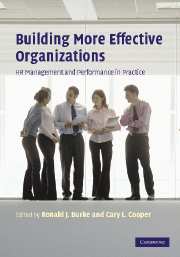Book contents
- Frontmatter
- Contents
- List of figures
- List of tables
- List of contributors
- Foreword
- Preface
- Acknowledgements
- Part I Building more effective organizations
- Part II Enhancing individual health and performance
- 2 Enthusiastic employees
- 3 Organizational citizenship behavior, transaction cost economics, and the flat world hypothesis
- 4 Best practices for work stress and well-being: Solutions for human dilemmas in organizations
- 5 Enhancing staff well-being for organisational effectiveness
- Part III Enhancing organizational health and performance
- Part IV Transforming organizations
- Index
3 - Organizational citizenship behavior, transaction cost economics, and the flat world hypothesis
Published online by Cambridge University Press: 05 June 2012
- Frontmatter
- Contents
- List of figures
- List of tables
- List of contributors
- Foreword
- Preface
- Acknowledgements
- Part I Building more effective organizations
- Part II Enhancing individual health and performance
- 2 Enthusiastic employees
- 3 Organizational citizenship behavior, transaction cost economics, and the flat world hypothesis
- 4 Best practices for work stress and well-being: Solutions for human dilemmas in organizations
- 5 Enhancing staff well-being for organisational effectiveness
- Part III Enhancing organizational health and performance
- Part IV Transforming organizations
- Index
Summary
Introduction
A substantial literature has developed regarding the nature, antecedents, and consequences of “organizational citizenship behavior” (OCB), or the discretionary non-task contributions rendered by participants to organizational viability and effectiveness (Organ, 1988; Podsakoff et al., 2000; Organ, Podsakoff, and Mackenzie, 2006). The empirical record indicates that individual perceptions and attitudes (e.g., job satisfaction, perceived fairness) or generalized “morale,” once regarded as determinants of “productivity,” actually better predict OCB (or, as some prefer, “contextual performance,” a form of contribution operationally measured in much the same terms as OCB, although defined somewhat differently as a formal construct; Borman and Motowidlo, 1997). More recently, at the organizational level, there is research evidence indicating that indeed operational measures of various forms of OCB are associated with superior group and organizational performance in terms of criteria such as efficiency, quality of output, and customer satisfaction (Podsakoff and Mackenzie, 1997; Walz and Niehoff, 2000; Koys, 2001).
What has remained elusive to date is the identification of an instructive framework of organization theory in which to fit OCB. Initial attempts to anchor OCB (e.g., Organ, 1988) within a “macro” context were not at all systematic, nor were they couched in any coherent theory, but rather took the form of some speculation as to why certain forms of OCB (such as helping coworkers or exhibiting yeoman-like levels of compliance to organizational rules and standards) could plausibly, ceteris paribus, contribute to higher levels of efficiency and effectiveness.
- Type
- Chapter
- Information
- Building More Effective OrganizationsHR Management and Performance in Practice, pp. 57 - 83Publisher: Cambridge University PressPrint publication year: 2007



